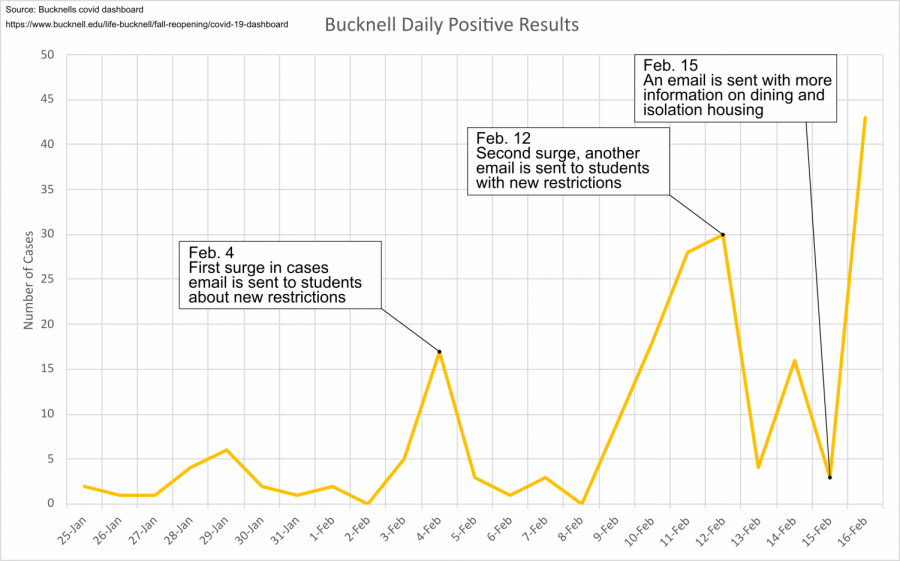Record-breaking surge in campus COVID-19 cases brings tighter restrictions
February 18, 2021
As of Thursday, Feb. 18 the University’s COVID-19 dashboard reveals a record-breaking number of on-campus positives. Currently, 173 people are infected with the virus, with 234 residing in isolation housing this week. This is more than the University has ever experienced. With over 75% of the isolation capacity filled, many are wondering, how do we proceed?
Addressing this capacity issue, University President John Bravman has announced the acquisition of 37 more off-campus isolation rooms. A new temporary quarantine policy states that students who have been contact-traced will no longer be moved to University-provided isolation housing. Instead, they will be expected to remain in their rooms. “Beginning tomorrow, students quarantining on campus will pick up their meals in the old Larison Dining Hall, a section of the facility not used by the general student population. They should not go to any other campus dining facilities…They will choose their meals in advance from a special menu using an online form,” Bravman said.
To help get a handle on the dramatic increase in cases, Bravman has also sent out an updated list of guidelines that he expects students to adhere to in the following weeks. Many of the former restrictions remain in place, such as all classes being held remotely until further notice and gatherings being restricted to no more than three people. Additionally, he recommends the use of double masks and advises against going off-campus unless “absolutely necessary.” Further, there will now be a 24-hour turnaround in test results.
Bravman’s latest announcement addresses the controversy around campus about having contact-traced individuals waiting in communal dining hall lines. However, there remains a great deal of discomfort about contact-traced students living among the rest of the student body with particular concern about possibly infecting roommates.
When asked about their experience in isolation housing at the Best Western, one student revealed that students were initially able to have a variety of food choices, but once the hotels got full, they started receiving “chef’s choice” for each day’s meal. “We get three meals delivered to us in a bag left outside our door around 4 p.m. each day. The day I got here, I was able to pick out my meal for the next day through a Google form menu, but as cases started to increase, they removed that option and now give you only what they have available,” Zoe Macuto ’23 said. Other students remarked about having only one hour of “outside time” in the parking lot, a very limited space and time period.
Despite the overwhelming apprehension and uncertainty that has clouded campus, Bravman believes that we will get through this so long as we remain patient and work together. “No doubt there is light at the end of the tunnel; no doubt that better days are ahead. But there’s also no doubt that this is not over; that there remains a great deal of uncertainty; and that vigilance is required,” Bravman said.
The number of on-campus Covid infections will function as major determinant in whether the seniors are able to have a Commencement. The final decision about this year’s Commencement plans will be decided in mid-March.





















